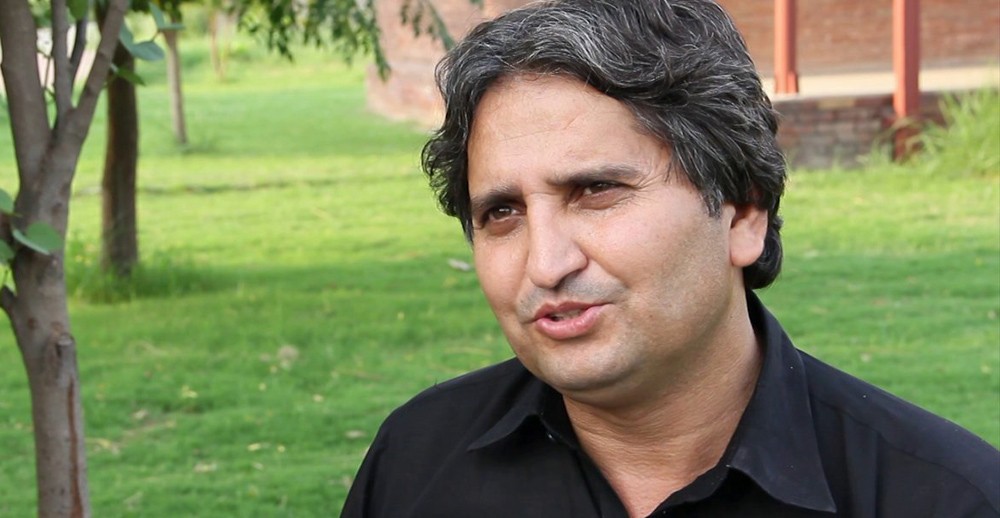
Both Ali Akbar Natiq and Ali Madeeh Hashmi deserve accolades for this fine example of creativity, consistency, and a unique collaborative vision

Ali Akbar Natiq is an intriguing and polarising writer in the sense that his Urdu short stories show a maturity of craft and technique not usually found in the work of his peers. On top of this, his personal history is equally disorienting. Originally trained as a mason, a specialist of minarets and mosque domes, he completed his formal education as an external or private candidate. His short stories and poetry started making an impact after they were published in prestigious Urdu literary magazines.
Then his first book of Urdu fiction titled Qaim Deen, containing some of his best short stories, appeared on the horizon. This slim volume established him as a master craftsman of the short story in the world of Urdu literature. He had announced and claimed his position with confidence and also divided the literary establishment.
Natiq highlighted the schism between the Urdu-speaking and the Punjabi-speaking writers who write in Urdu by befriending and offending the stalwarts of both the camps and by not declaring his solidarity with any single camp.
However, this translation into English of some of Natiq’s best stories is something else altogether. It has catapulted Natiq into the stratosphere where only the cosmopolitan writers are supposed to exist because of their fluency with the global lingua franca. Despite their immaculate craft and the uniqueness of their literary visions, writers who write in national and local languages (Urdu, Punjabi, Sindhi, Pashto and Balochi) are not linked with the global circulation of literary products because of their disconnect with the international market.
Those who consider this disconnect as a blessing because somehow it does not link local products with the global market should also consider the limitations of remaining only local. A lot of contemporary literary sensibility is only accessible to Pakistani readers because it is possible to read Borges, Marquez, Reinaldo Arenas and Gunter Grass in English.
In this context, this volume of short stories globalises through English those aspects of rural Punjabi life that have remained only part of the local experience. Those local experiences, though sometimes essentialised through nativist attitudes, are then transformed by Natiq’s unique sensibility which ranks equal to that of Manto and Ghulam Abbas when it is truly universal. At times, this reader felt that Natiq has not been able to transcend his parochialism because, for a writer to be truly universal, he or she has to go beyond the accidents of his or her birth, culture, identity so that he or she can speak about the wretchedness of the human condition.
For example, the short story ‘The Maulvi’s Miracle’ has a malignant maulvi named Maulvi Abdur Rehman and his critic is named Raza Ali. This can be interpreted as a sectarian way of naming the characters but the problem is even deeper. A writer has to depict reality without reproducing the injustice built into the structures of social life. This is the issue with Natiq’s work which will be debated for decades to come.
Ali Akbar Natiq is not Michel Foucault who declared identity to be a trap and even questioned the processes through which human beings are produced as subjects. We read Borges and Foucault because they help us understand the mess we are in as human beings "suspended in language." We read Natiq because he lays bare how injustice works through the disenfranchised people and how heartbreaking human greed and vanity becomes.
The task of bringing Natiq’s work into English had started earlier with the publication of Mohammed Hanif’s translation of Momaar Ke Haath as A Mason’s Hand, which originally appeared in Granta and Natiq became their New Voice in March 2011 (A Mason’s Hand is also included in this volume as a contribution from Hanif). Ali Madeeh Hashmi has preserved Natiq’s vision and transported it into a carefully constructed form of English.
Those who are going to read Natiq only in English will not feel that it is a work of translation but those who have read the original will be able to tell that the English version is more formal than the original. The translator, a trained psychiatrist by profession, has also announced his arrival in the same way as Natiq did. Both Natiq and Ali Madeeh Hashmi deserve accolades for this fine example of creativity, consistency, and a unique collaborative vision.